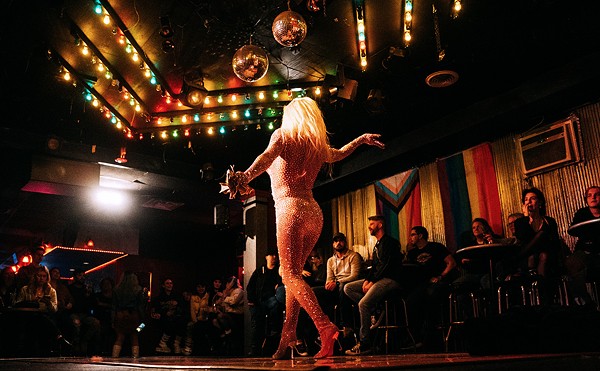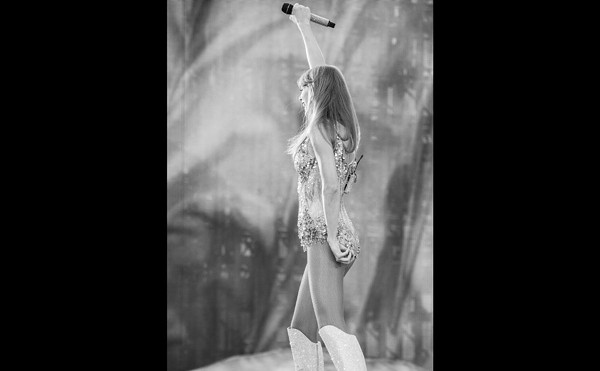Critic's Pick
I’ve complimented the Cincinnati Playhouse’s Blake Robison for his efforts this season to feature female playwrights. (Half of the shows he chose for 2015-2016 are by women.) The truth of the matter is that it really shouldn’t matter if a writer is male or female, but in fact, recent research revealed that, of all the plays staged at theaters across America over three seasons (2011-2014), just slightly more than 20 percent were by women. That needs to change.
Lauren Gunderson will go a long way to create greater balance: Her new play, The Revolutionists, commissioned by the Playhouse and presently receiving its world premiere on the Shelterhouse stage, is the best show presented at the Mount Adams theater this season — regardless of the writer’s gender. That’s all the more meaningful, because it’s about women who are writers, activists and public figures. It’s simply a brilliant script that’s getting a spectacular production.
First, the concept: The play’s four characters are women who lived (and died) during the French Revolution’s “Reign of Terror.” Three are based on real, historical women: Deposed Queen Marie Antoinette (Jessica Lynn Carroll), young assassin Charlotte Corday (Keira Keeley) and playwright Olympe de Gouges (Lise Bruneau). The fourth, Marianne Angelle (Kenita R. Miller), is a composite character, a woman of color from the Caribbean Island of St. Domingue (now Haiti), in France to advance the cause of liberty. All are “enemies” of the revolution, likely on their way to the guillotine.
They certainly never coincided in 1793 when the play is set, but Gunderson’s concept has them in spirited interaction, four funny, witty women who fuss with and inspire one another. Each is concerned with history and reputation, and that’s part of Gunderson’s underlying motive — to put these specific women back into history, which largely ignores the roles played by all women across time. De Gouges is the story’s motivator, striving to write a play about the events and catastrophes of the Revolution but becoming fascinated with each of her “sisters,” while waxing and waning in her enthusiasm for their causes and dangerous lives.
Gunderson has the four characters speak in the vernacular of 21st-century women, casual and self-aware. Of course, they’re dressed in 18th-century attire (especially Carroll as crazy-like-a-fox Marie Antoinette) and spend most of their time in an exquisite Empire drawing room — ebony-paneled walls with wall sconces and a chandelier above the beautiful parquet floor. So the contrast between their physical existence and their more modern words and attitudes often drives the humor. (At one point, the former queen imagines France as an ingénue tied to a train track. She pauses and asks blithely, “And what are trains?”)
Carroll steals most every scene as the self-indulgent queen, waltzing in wearing sunglasses and exclaiming, “I’m so famous,” constantly fussing with ribbons and baubles she finds in the folds and sleeves of her scandalously low-cut dress. But Keeley’s badass Corday, with a steak knife strapped to her thigh to murder the radical journalist Marat, is also an attention-grabber. She is comically blunt, impatient and eager for fame, demanding de Gouges to provide her the necessary words to drive home her political message. Miller’s sensible Marianne is the play’s rational anchor, full of feeling and common sense, but quick with a sassy remark to undercut anyone who gets too high-handed.
As the playwright de Gouges, Bruneau has the most complex role, switching from meta-observations about writing and theater to delivering a “Declaration of the Rights of Women” to the unsympathetic assembly of male revolutionary leaders. Bruneau nicely captures de Gouges’ doubts and desires, and her sharp intellect and deep feelings frame the show’s action.
Director Eleanor Holdridge has fused these four performers into an intriguing ensemble, and the dynamic between them as they grow to care about one another despite their dramatic differences gives the show its emotional depth. Marie Antoinette hopes her reputation will be improved by de Gouges’ play, and in fact by the end of the story, you’ll see her in a very different light.
But part of Gunderson’s point in all this is that the audience — those of us watching with our “beating hearts” — provides the connections to the future that will keep history flowing. We are better for having met Olympe, Charlotte, Marianne and Marie.
THE REVOLUTIONISTS, presented by the Cincinnati Playhouse in the Park, continues through March 6.






